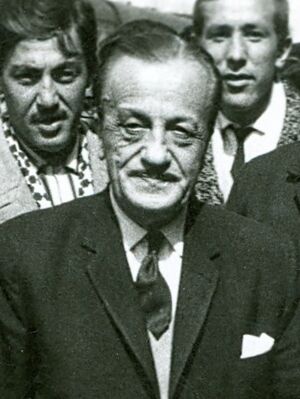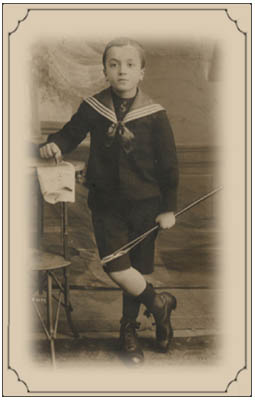Necip Fazıl Kısakürek facts for kids
Quick facts for kids
Necip Fazıl Kısakürek
|
|
|---|---|

Necip Fazıl in the 1950s
|
|
| Born |
Ahmed Necib
May 26, 1904 |
| Died | May 25, 1983 (aged 78) Istanbul, Turkey
|
| Spouse(s) | Neslihan Kısakürek |
| Era | 20th-century philosophy |
| Region | Islamic philosophy |
| School | Sufism |
|
Main interests
|
Poetry, politics, literature |
|
Notable ideas
|
Founder of Büyük Doğu |
|
Influences
|
|
|
Influenced
|
|
| Signature | |
 |
|
Ahmet Necip Fazıl Kısakürek (born May 26, 1904 – died May 25, 1983) was a famous Turkish poet, writer, and thinker. People often called him simply NFK. He was known for his strong ideas about Islam and Turkish society. He was even noticed by the French philosopher Henri Bergson, who later became his teacher.
Contents
About Necip Fazıl Kısakürek
Necip Fazıl Kısakürek was born in 1904 in a large house in Istanbul. His family was important, and his father worked as a judge. His mother came from Crete. He was named after his great-grandfather and his father.
His Early Education
Necip Fazıl went to many different schools when he was young. These included a French school, Robert College in Istanbul, and the Naval School. He learned about religion from Ahmed Hamdi and science from Yahya Kemal.
He was especially inspired by a teacher named İbrahim Aşkî. This teacher helped him explore many subjects, from literature to philosophy and even math. İbrahim Aşkî also introduced him to Sufism, which is a spiritual part of Islam. After the Naval School, Necip Fazıl studied philosophy at Istanbul University. He graduated between 1921 and 1924.
Studying in Paris and Early Career
In 1924, Necip Fazıl received a scholarship to study in Paris for a year. When he returned to Turkey in 1926, he worked at several banks. Later, he taught at universities in Ankara and Istanbul.
He soon decided to focus on writing. He left his government jobs to become a full-time writer and magazine publisher.
A Turning Point: Meeting Abdülhakim Arvasi
In 1934, Necip Fazıl's life changed when he met Abdülhakim Arvasi. Arvasi was a spiritual leader of the Sufi Naqshbandi order. Necip Fazıl became one of his most important students and followed his teachings until Arvasi passed away in 1943.
His Views and Recognition
Necip Fazıl had very strong ideas about society and politics. He believed that Western civilization had problems and that certain groups were responsible for them. He also thought these ideas caused issues for Muslims and the Ottoman Empire. He wrote about these views in his publications.
Despite some of his controversial opinions, Necip Fazıl was recognized for his literary work. He won the First Prize of the C.H.P. Play Contest in 1947 for his play Sabır Taşı (Stone of Patience). He also received awards like the "Great Cultural Gift" from the Ministry of Culture in 1980. The Foundation of Turkish Literature called him the "Greatest Living Poet of Turkish" when he turned 75.
Necip Fazıl Kısakürek passed away on May 25, 1983, in his home in Istanbul. He was buried in the Eyüp Cemetery.
His Ideas on Turkish Identity
Necip Fazıl Kısakürek wanted to change how people thought about Turkish identity. At the time, the government promoted a secular (non-religious) idea of nationalism. Necip Fazıl wanted to replace this with an Islamist view, where Islam played a bigger role in national identity. He believed that society should be "Islamized from above," meaning through government leadership.
Influence on Turkish Politics
Since the late 1970s, Necip Fazıl has been a very important figure for Turkish Islamists. Many members of the Justice and Development Party (AKP) have been inspired by his ideas. This includes Recep Tayyip Erdoğan, who met Kısakürek when he was a student. Erdoğan also attended Kısakürek's funeral when he was starting his political career.
His Literary Works
Necip Fazıl started reading and writing at a very young age. He said his "poetry started at the age of twelve." He recalled his mother wishing he would become a poet, which inspired him greatly. He decided then and there that he would be a poet, and he did!
His first published poem was "Kitabe" (Inscription). It later appeared in his book Örümcek Ağı (Spider Web) under a new title, "Bir Mezar Taşı" (A Gravestone). This poem was published in a magazine called Yeni Mecmua in 1923.
By 1939, his poems and articles were published in many popular magazines. These included Yeni Mecmua, Milli Mecmua, Anadolu, Hayat, and Varlık. His work also appeared in the Cumhuriyet newspaper.
Founding Magazines
After returning from Paris in 1925, Necip Fazıl started a magazine called Ağaç (Tree) in 1936. This magazine focused on spiritual and idealist ideas. It was different from other magazines of the time that supported materialist and Marxist views. Ağaç was first published in Ankara and later moved to Istanbul, but it eventually closed.
Necip Fazıl then started his most famous magazine, Büyük Doğu (Great East). It began in 1943 and was published off and on as a weekly, daily, or monthly magazine. In 1978, the magazine faced challenges and was forced to close. Necip Fazıl also published a short-lived political humor magazine called Borazan (Bugle).
 | Bessie Coleman |
 | Spann Watson |
 | Jill E. Brown |
 | Sherman W. White |


